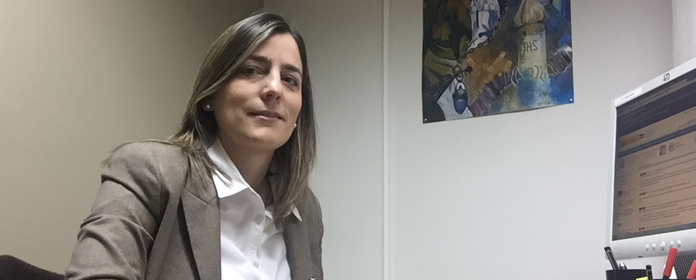"Advances in research and preventive policies promote the development of higher quality patient services."
Susana Andueza (Far 99, PhD 04) gave a talk at the framework of the Master's Degree Meetings at research, development and Drug Innovation (MIDI).

PHOTO: Courtesy
Susana Andueza, graduate and doctor in Pharmacy from the University of Navarra, has been one of the speakers at the meetings promoted by the Master's Degree at research, development and Medication Innovation (MIDI), the Meetings, which will bring some twenty experts in different areas to campus during the 16-17 academic year.
- As an alumna of School and a doctoral student of the University, how do you consider that your training has helped you to direct your professional degree program ?
The licentiate degree in Pharmacy provided me with a solid knowledge in many subjects that opened up a wide range of employment opportunities. In addition, at the University of Navarra the practical nature of training financial aid helped me acquire many skills that you will need in your professional life.
result On the other hand, during doctorate I became more specialized and focused on the world of research, laboratory, publications and teaching, which has been very useful in my work. During this period I was surrounded by a group of great people and professionals, who supported me and helped me make decisions. In fact, I consider that another important aspect throughout my training has been the advice I have received.
- What role does a graduate and doctor in Pharmacy play in the Government Delegation in Catalonia?
work Within area of Health, in the Pharmaceutical Inspection Service of Barcelona. goal Here we carry out two fundamental activities: on the one hand, we carry out inspections of manufacturers and importers of health products, cosmetics and pharmaceutical laboratories in their respective procedures before the Spanish Agency of Medicines and Health Products, with the aim ofverifying the technical and sanitary conditions in which they are developing their activity and compliance with the legislation.
On the other hand, we carry out border health controls on pharmaceutical products (pharmaceutical raw materials, medicines, medical devices, cosmetics and biocides) at the time of their arrival at entrance to the European Union through Barcelona customs. Here, as head of the Service, I coordinate the team of pharmaceutical inspectors.
- What developments would you highlight in your field of work?
We have already been working for several years to strengthen the legal supply chain of medicines and to protect the population from counterfeit medicines and active ingredients. With the evolution and changes in the field of drug distribution, its complexity has increased and greater control has become necessary in each of the links of the supply chain.
In our daily work we perform inspections to verify good distribution practices, even in warehouses under customs control or surveillance. We also perform additional checks on the importation of active ingredients with the goal to ensure compliance with good manufacturing practices in third countries.
In the case of medical devices, new European regulations will be introduced at approve to provide a legal framework with a high level of health protection guarantees and to extend the supervision and cooperation of health authorities. This legislative change is of great public interest, due to the fact that a large number of people use different medical devices on a daily basis, which will be even more closely monitored.
- From your experience, what are the most imminent challenges for professionals working on research, development and drug innovation?
From my point of view, the research with drugs is a highly complex process that requires a high issue of qualified professionals, as well as sufficient material resources. In this sense, one of the great challenges is the financing of the researchers themselves, despite the fact that efforts are already being made by the pharmaceutical industry, as well as by the research centers and the public administrations.
With regard to scientific advances, some of the most important areas are development of new active ingredients, biotechnology, advanced therapies and personalized medicine.
- Do you consider that scientists are underrepresented in public administrations? What plus do you think you can contribute to the public management ?
I really don't think so. All public administrations, both national and regional, have a multitude of research centers and organizations, where great professionals work in all scientific areas and fields.
Regarding the contribution to the public management , in my opinion the advances in research and preventive policies promote the development of higher quality services to the patient at a lower cost.
